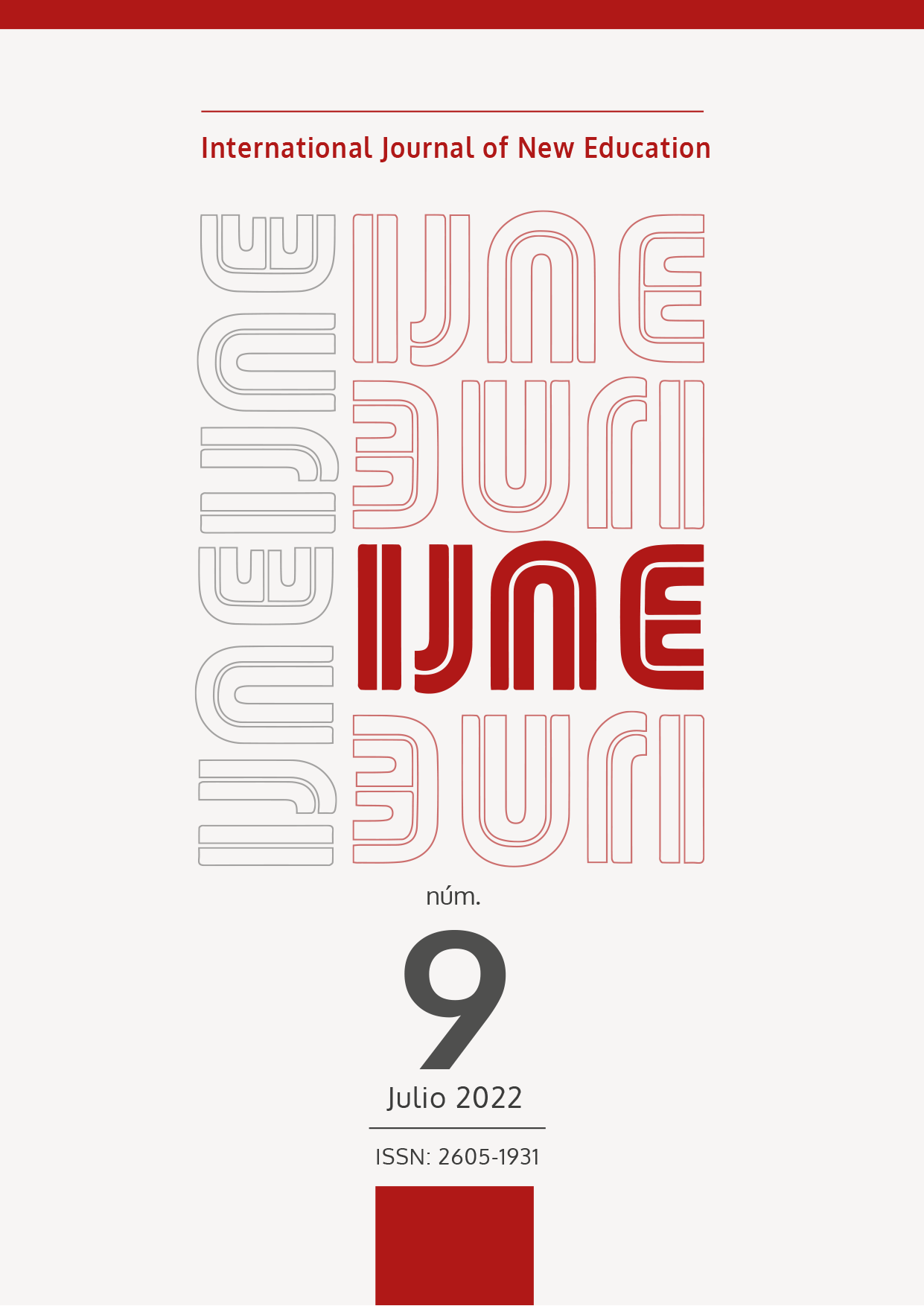Design and validation of an instrument to assess research strategies and ubiquitous learning in teacher training.
DOI:
https://doi.org/10.24310/IJNE.9.2022.14017Keywords:
Evaluation, Research strategies, Ubiquitous learning, ValidationAbstract
A study was carried out at the level of teachers in Uruguay that is part of a research with a mixed approach, longitudinal cut from the perspective of participatory action research. In this article the focus is placed on the design, validation and implementation of an instrument that allows quantifying the development of investigative strategies (IS) framed in ubiquitous learning (UL) by future teachers from different disciplines.
The instrument was built from one used for secondary education in a doctoral thesis. The modifications consisted of adapting it to the level of teaching staff and to topics related to this training. During the construction process, it was put for the consideration of new teachers and it was also submitted to validation by national and international experts.
The phases of the process made it possible to select a set of investigative strategies, as well as the construction of indicators that allow quantifying their development, also alluding to the incorporation of digital technologies in the research process.
The work in the research team and the intervention of the experts made it possible to improve the instrument in relation to the criteria of clarity, representativeness and adequacy. In light of the results of the validation, it is possible to affirm that it is an instrument that has what is necessary to quantify the development of IS within the framework of UL at the teacher level.
The internal consistency analysis, for ordinal variables, w McDonals, was acceptable (0.793). Meanwhile, the data was subjected to a factor analysis, using the principal components method of SPSS v.25 (IBM, 2017). The Kaiser-Meyer-Olkin test and Bartlett's sphericity test (KMO = 0.756 and Bartlett's significance -p = 0.000-), show the adequacy of the analysis of the data to the model.
Downloads
Metrics
Publication Facts
Reviewer profiles N/A
Author statements
Indexed in
-
—
- Academic society
- N/A
- Publisher
- Universidad de Málaga
References
Administración Nacional de Educación Pública (2016). Marco teórico de Ciencias Naturales PISA 2015. https://www.anep.edu.uy/sites/default/files/images/Archivos/publicaciones-direcciones/DSPE/pisa/pisa2015/otras-publicaciones/pisa%202015%20marco%20teorico%20ciencias.pdf
Buela-Casal, G. & Sierra, J.C. (1997). Manual de evaluación psicológica: fundamentos, técnicas y aplicaciones. Siglo XXI de España Editores.
Burbules, N. C. (2014). Los significados de "aprendizaje ubicuo". Archivos Analíticos de Políticas Educativas, 22, 1-10. https://www.redalyc.org/pdf/2750/275031898130.pdf
Cárdenas-Aguilera, P.S. (2014). Instrumentos de evaluación: ¿qué piensan los estudiantes al terminar la escolaridad obligatoria? Perspectiva Educacional, 53(1), 57-72. http://www.redalyc.org/pdf/3333/333329700005.pdf
Denzin, N. & Lincoln, Y. (coord.) (2012) Manual de investigación cualitativa. Gedisa.
Escobar-Pérez, J. & Cuervo-Martínez, Á. (2008). Validez de contenido y juicio de expertos: una aproximación a su utilización. Avances en Medición, 6, 27-36. http://www.humanas.unal.edu.co/psicometria/files/7113/8574/5708/Articulo3_Juicio_de_expertos_27-36.pdf
Franco Mariscal, A. J. (2015). Competencias científicas en la enseñanza y el aprendizaje por investigación. Un estudio de caso sobre corrosión de metales en secundaria. Enseñanza de las Ciencias, 33 (2), 231-252. https://raco.cat/index.php/Ensenanza/article/view/293274
IBM Corp. Released (2017). IBM SPSS Statistics for Windows, Version 25.0. Armonk, NY: IBM Corp.
Imbernón, F. (coord.) (2002). La investigación educativa como herramienta de formación del profesorado. Reflexión y experiencias de investigación educativa. Graó.
Imbert Romero, D. (2020). Análisis del impacto del modelo didáctico de aprendizaje por indagación en biología, sobre el desarrollo de la competencia científica en estudiantes de educación secundaria [Tesis doctoral, Universidad Internacional Iberoamericana]. RIdAA-CFE. http://repositorio.cfe.edu.uy/bitstream/handle/123456789/1337/Imbert%2c%20D.%2c%20Analisis.pdf?sequence=2&isAllowed=y
Imbert Romero, D. y Elósegui Bandera, E. (2020). Mejoras en el desarrollo de la competencia científica en estudiantes de primer año de secundaria en un liceo de Uruguay. MLS Educational Research, 4 (1), 22-40. https://www.mlsjournals.com/Educational-Research-Journal/article/view/247
Kerlinger, F.N. & Lee, H.B. (2002). Investigación del comportamiento. Métodos de investigación en ciencias sociales (4ª ed.). McGraw-Hill.
Mendoza-Gómez, J. & Garza-Villegas, J.B. (2009). La medición en el proceso de investigación científica: evaluación de VC y confiabilidad. Innovaciones de Negocios, 6 (1), 17-32. http://eprints.uanl.mx/12508/
Montero, I. & León, O. (2005). Sistema de clasificación del método en los informes de investigación en psicología. International Journal of Clinical and Health Psychology, 5(1), 115-127. http://www.redalyc.org/articulo.oa?id=33701007
Turpo-Gebera, O., Quispe, P. M., Paz, L. C., & Gonzales-Miñán, M. (2020). La investigación formativa en la universidad: sentidos asignados por el profesorado de una Facultad de Educación. Educação e Pesquisa, 46, 1-19. https://www.scielo.br/j/ep/a/bvYGHxgCpxB8sKNNp6zd3sN/?format=pdf&lang=es
Ricardo Velázquez, M., Amat Abreu, M., Andrade Santamaría, D. R., Jiménez Martínez, R., & Cisneros Zúñiga, C. P. (2019). Desarrollo de competencias investigativas formativas: retos y perspectivas para la Universidad. Dilemas Contemporáneos: Educación, Política y Valores, 6, 1-26. https://www.dilemascontemporaneoseducacionpoliticayvalores.com/index.php/dilemas/article/view/1472/1650
Espinoza Freire, E. E. (2020). La investigación formativa. Una reflexión teórica. Conrado, 16 (74), 45-53. http://scielo.sld.cu/pdf/rc/v16n74/1990-8644-rc-16-74-45.pdf
Downloads
Published
How to Cite
Issue
Section
License
Las obras se publican en edición electrónica bajo una licencia Creative Commons Reconocimiento-NoComercial 4.0 España: se pueden copiar, usar, difundir, transmitir y exponer públicamente, siempre que:
a) Se cite la autoría y la fuente original de su publicación (revista,
editorial y URL de la obra.
b) No se usen para fines comerciales.
c) Se mencione la existencia y especificaciones de esta licencia de uso.
Será responsabilidad exclusiva de los autores obtener los permisos necesarios de las imágenes que estén sujetas a derechos de autor.










16.png)
